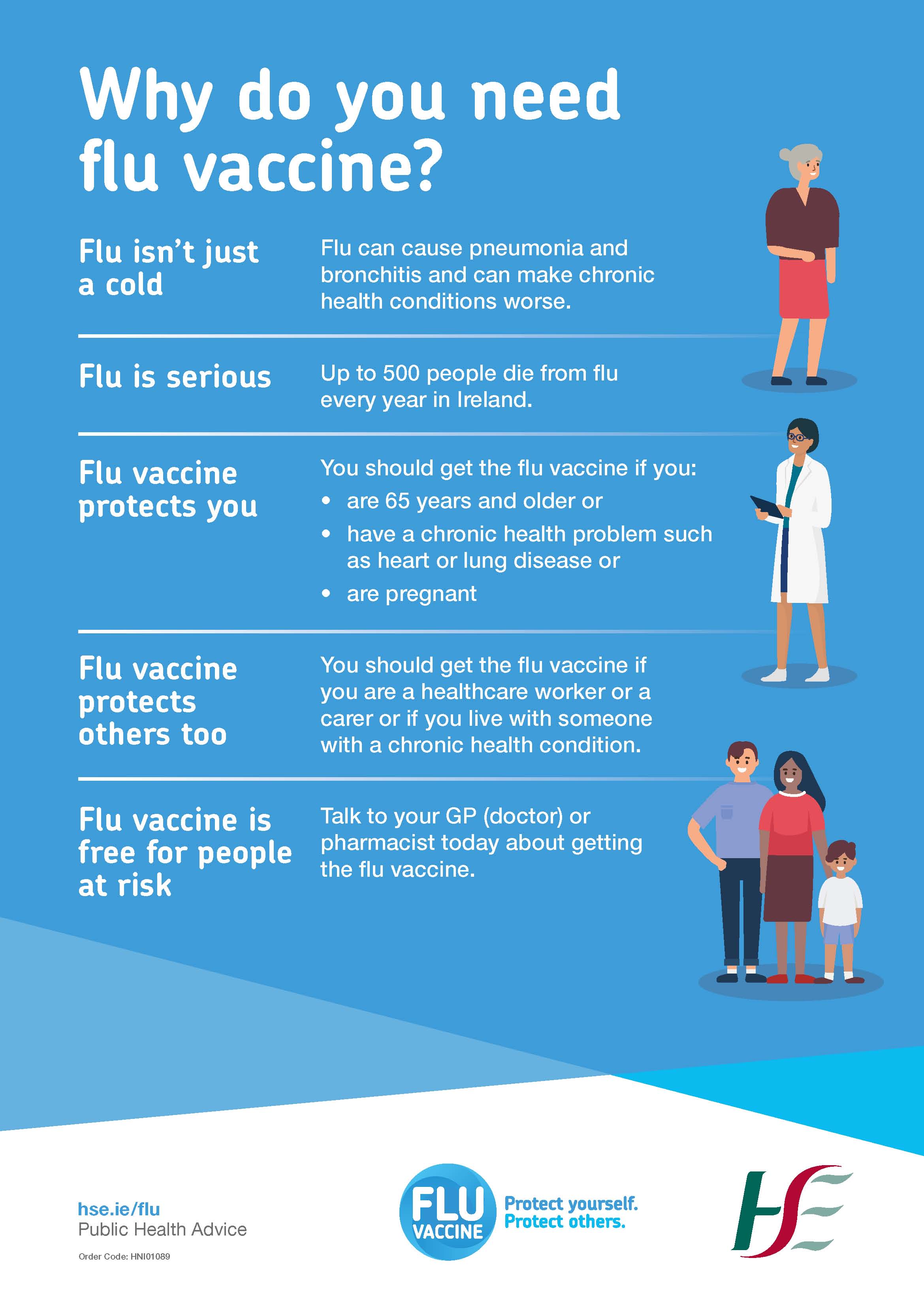The flu vaccine for at-risk groups will be available from the end of September 2020.
The flu vaccine for children will be available from the middle of October 2020.
Seasonal flu (also known as influenza) is a highly infectious illness caused by the flu virus.
The virus infects your lungs and upper airways, causing a sudden high temperature and general aches and pains, headache, weakness and exhaustion. Symptoms can last for up to one week. You may need to stay in bed until your symptoms get better. Flu affects people of all ages. In some people flu can cause serious complications such as pneumonia.
How serious is flu?
The Flu virus is an unpredictable virus.
If you are healthy you will usually recover in 7 days. But Flu can be severe and can cause serious illness and death.
Complications of flu include bronchitis, pneumonia, ear infections and rarely acute encephalopathy (swelling of the brain).
Serious complications of flu are more likely if you have a chronic medical condition or if you are aged 65 years or older. Pregnant women are also at increased risk of flu complications.
In Ireland, between 200 and 500 people, mainly older people, die from flu each winter.
Every year, around the world, flu causes between 3 and 5 million cases of severe disease and up to 646, 000 deaths.
At risk groups
Flu is more severe in people aged 65 years and over, pregnant women, and anyone with a long-term medical condition. The HSE is urging people in at-risk groups to get the flu vaccine.
People aged 65 years and over
Pregnant women
People (adults and children) with long-term medical conditions such as diabetes, heart disease, liver, kidney disease, cancer, chronic lung disease including COPD, or neurological diseases
People whose immune system is impaired due to disease or treatment including cancer patients
Persons who are obese who have a body mass index (BMI) of over 40
People with Down syndrome
Residents of nursing homes and other long-stay institutions
Healthcare workers
Carers and household contacts of people at medical risk of the complications of flu
People with regular close contact with poultry, water fowl or pigs
Flu vaccine is also recommended for children aged 2 to 12 years for the 2020/2021 influenza season.
The difference between a cold and the flu
Flu symptoms come on suddenly with a fever, muscle aches, headache and fatigue. A cold usually starts gradually with a sore throat and a blocked or a runny nose. Symptoms of a cold are generally mild compared to flu.
Flu and cold symptoms
SYMPTOMS
SEASONAL FLU
COLD
Fever
High fever lasts 3-4 days
Rare
Headache
Prominent
Rare
General aches, pains
Usual; often severe
Slight
Fatigue, weakness
Can last up to 2-3 weeks
Quite mild
Extreme exhaustion
Early and prominent
Never
Stuffy nose
Sometimes
Common
Sneezing
Sometimes
Usual
Sore throat
Sometimes
Common
Chest discomfort, cough
Common; can become severe
Mild to moderate; hacking cough
How flu is spread
If you are carrying the virus, you can spread it by coughing or sneezing. This can happen from 1-2 days before symptoms develop and up to 5 days after symptoms develop.
Flu can survive on worktops and objects, especially in low temperatures and low humidity. You can get flu by touching a surface with the virus on it and then touching your mouth, eyes or nose. The virus can live on a hard surface for up to 24 hours and a soft surface for around 20 minutes.
More information
Return to immunisation.ie

